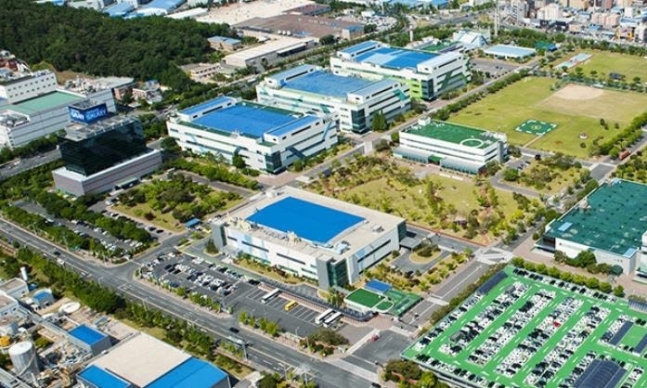
Samsung Electronics’ plant in Gumi (Samsung Electronics via The Korea Herald/Asia News Network)
SEOUL — The novel coronavirus is disrupting the plants of Korea’s major conglomerates, as new confirmed cases reported one after another involve their employees.
On Sunday, Samsung Electronics confirmed its third case of COVID-19 infection, of a worker at its smartphone plant in Gumi, North Gyeongsang Province.
The Gumi site produces next-generation smartphones such as the Galaxy Z Flip and Galaxy Fold. The assembly line where the employee worked is temporarily closed and expected to be fully functional early next week.
On Feb. 22, a facility in Gumi was shut down for about three days as an employee of the smartphone division was confirmed with COVID-19. Six days later, one more employee of the firm’s network business division at the Gumi plant was also confirmed.
LG Display shut down its module plant Saturday for three days after an employee of a bank on the campus of the Gumi plant was confirmed to be infected. The plant assembles small and medium-sized liquid crystal display and organic light-emitting diode panels and components.
The Gumi industrial complex, home to leading Korean companies, including Samsung and LG, is nearby Daegu, in an area that has more than 70 percent of the confirmed COVID-19 cases in Korea.
Hyundai Motor’s Ulsan plant also found a confirmed case of COVID-19 infection Friday. The automaker halted operations of the facility and identified the workplace, route and points of contact of the confirmed patient. The plant produces large sport utility vehicles such as the Palisade and Genesis GV80.
Korean carmakers have already been slowing down their factory lines and suspending production lines for a few days due to the disruption of parts supplies from China last month.
Last week, Lotte Foods, SK Telecom and LS Group closed their respective headquarters in Seoul after employees there were found to have been infected.
Alongside businesses here, Korean companies are having difficulties in doing business on the global market, as foreign countries have been restricting Koreans from traveling to their countries. As of Sunday, the number of countries that limit Korean entry increased to 71 countries, including Vietnam, where more than 3,000 Korean firms have a business presence.
Global companies are also restricting their employees from traveling to Korea in response to the spread of the new COVID-19 infection. Google has restricted its employees from traveling to Korea and Japan. Uber has limited its employees from traveling to Korea, Iran, Italy and China. Amazon went further, blocking its employees from moving even within the US.